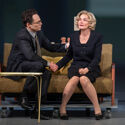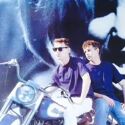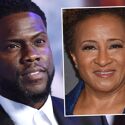
A League Of Their Own is one of those movies the gays have always adored.
There are, of course, the obvious reasons for this: namely, Madonna, Rosie O’Donnell, Geena Davis, Lori Petty… we could go on.
But fabulous casting aside, there’s a deeper reason why Penny Marshall’s 1992 film has endured for LGBTQ audiences despite not having any explicitly gay characters in it. It’s because the story of A League Of Their Own—a fictionalized account of the very real All-American Girls Professional Baseball League (AAGPBL)—has always been queer.
It’s a fact that’s only recently come to light, as 95 year-old former AAGPBL player Maybelle Blair—who consulted on both the film and the Amazon series—publicly came out for the first time in her life and shared that she was not alone. In fact, she estimates about 70% of the AAGPBL was queer.
How about we take this to the next level?
Our newsletter is like a refreshing cocktail (or mocktail) of LGBTQ+ entertainment and pop culture, served up with a side of eye-candy.

At an Outfest screening of the new episodes moderated by O’Donnell, Blair said she always felt that element was missing from the movie, though she understands why. (For her part, O’Donnell revealed that she thought of her character, Doris Murphy, as gay—and played her as such!)
But the reimagining of A League Of Their Own 30 years later presents an opportunity to depict a more authentic version of Blair’s life and the lives of her teammates. Across its 8 episodes, the series’ charming ensemble brings a nuanced approach to multiple journeys of self-discovery, all while maintaining the classic film’s signature blend of heart and humor.
In advance of A League Of Their Own’s premiere, Queerty caught up with its creators and stars to talk about why they’ve always loved the ’92 film, and to tease the ways in which the show brings LGBTQ stories to the forefront.

Abbi Jacobson – “Carson Shaw,” Series Co-Creator
It’s an iconic queer film even though no one is queer in it! [And it has] the same thing we are going for in this reimagining: When people see it, they feel very connected to the characters because these characters are sort of finding their people. They’re these sort of outsiders–they’re people that maybe didn’t fit in where they came from, but they finally found their place in a space where they can fully be themselves. And, in 1992, maybe they couldn’t—in the film—really express all the ways in which they did feel alone. But we can kind of dive into that now, and so I think that we’re able to tell a lot more stories and a lot more thoroughly—and juicily—than Penny [Marshall] was able to.
Chanté Adams – “Max Chapman”
When we first started production, we were able to sit down with Maybelle, and she told us that about 70% of the [AAGPBL] league was queer. But they had to hide that and they weren’t able to showcase their authentic selves. I do think people knew or picked up on the underlying history there, and I think that people in a lot of communities—especially in minority communities—gravitated towards this movie for that specific reason. And so that’s why I’m super excited for our show to be able to expand on that and bring those stories—those black stories, those queer stories—to light.
Related: Let’s revisit the ill-fated 1993 ‘A League Of Their Own’ sitcom that nobody remembers

Melanie Field – “Jo De Luca”
You know, we gays we love a costume! [Laughs.] But also I just feel like the story of women stepping into these traditionally male roles is so empowering. It’s so exciting! To know that this was based on history as well—like, this isn’t just some fantasy that Penny Marshall came up with. These women existed. They wrote books, we’ve read their books, we know what they went through. I just think that there’s something about finding your own family or finding your own team that is really resonant in the original movie. That, plus the individual characters are so lovable. I remember watching it and just being like, “ I want to be on that team!” I wanted to be friends with them, and I wanted to hang out with them.
Kelly McCormack – “Jess McCready”
I think sports and the queer community have always had a very healthy relationship. I know, for me, sports was always a haven to find like-minded people. I think sports are an opportunity for people to sort of work on themselves in a different way and find a new team and find a new family and all that stuff. So I think that’s kind of why people gravitate towards that movie—because these are outsiders, misfits, people who were finding a new way to be a part of a family when they didn’t feel that elsewhere.”
Will Graham – Series Co-Creator
“I was drawn to the movie when I was a kid in the way that queer children are often drawn to things with queer subtext before you even know what it means to be queer. And I think it’s because that’s communicated in the spirit of the story, even if it’s not in the text of the story. Obviously, the movie came out in 1992—it was revolutionary for a time, but also a lot of things weren’t talked about because it was1992 and it was a two-hour movie. But I think—and Rosie has said this, too—that there was intent on the part of some of the actors and from other people to bring that spirit to the story. And what we have is the immense privilege to do is just to go back to the real stories underneath it and to get to tell the full truth this time.”
A League Of Their Own premieres exclusively on Amazon Prime Video on August 12.





















graphicjack
yah, Rosie’s character always read to me that she was in love with Madonna’s.
kish
Rosie has said that Doris was queer, but Penny Marshall did not want to tell that aspect of the story.
dbmcvey
If, when that movie was made, they had acknowledged any lesbian content the movie would not have gotten the release it did. It would have been a small indy film and the studios wouldn’t have made it in the first place.
dbmcvey
I love the movie and I love the TV series.